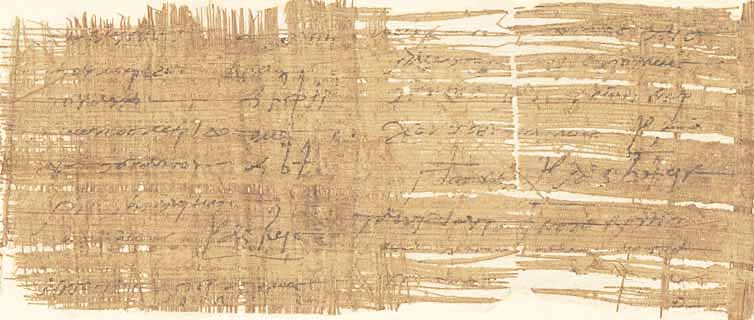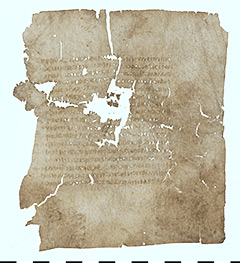P. 13229 A+B
Cicero’s speeches are well-known across the world but only very few people are familiar with original copies – and nearly nobody knows that Egyptian transcripts of his works exist which have been written in late Antiquity. The story of these unusual and extremely rare fragments will be told in the following text.
To escape from the potential dangers of the reign of the tribune P. Clodius Pulcher, the public condemnation and a legal banishment, Cicero left Rome in 58 AD and settled in Thessaloniki. He was protected by the quaestor Cn. Plancius. Shortly after Plancius had won the election in 55 AD and was made aedile, he was accused of electoral fraud by M. Iuventus Laternis who stood as a candidate for aedileship as well but had lost and could not handle his defeat. As an act of gratitude for the protection that Plancius had offered him, Cicero defended his close friend successfully in court.
The present parchments, written in Latin, reveal two chapters of Cicero’s speech for Plancius. The eleventh chapter (A, page 1 and 2) is used by Cicero to describe Plancius’s career, his military and political stations, which noble qualities his mandate has acquired in his career and that the whole of his fellow-men also respects and admires him. These lines present the aedile extremely positive. The nineteenth chapter (B, page 1 and 2) deals with the Plancius‘ experience and his effect on other citizens as a leader in the community. Cicero sums up that the successful election of Plancius was not surprising since he was popular among the voting population.
The classical archeologist and teacher Otto Rubensohn, who became known as the dicoverer of the Aramaic Elephantine papyri, discovered these parchments in an excavation, which he conducted on behalf of the German papyrus cartel, in Eschmunen, the ancient Hermupolis, in 1905.
The literary fragments were copied by an unknown writer during the 5th century AD who must have worked with an original copy in a good condition. The scribe used dark ink on both parchments which are double-sided codex sheets, which have a square layout and a format of about fifteen by fifteen centimeters. The present copy of the speech „Pro Plancio“ is relatively well-preserved. Fragment A has a larger missing part in the middle of the parchment leaf and medium sized cracks at the edges. The content could therefore only be obtained by other remaining copies of the speech. The parchment B, however, has fewer breaks and smaller holes in text-free places.
These copies were most likely used for didactic purposes, since even in late antique Egypt Cicero’s speeches were used as an example of Roman high culture and excellent rhetoric.
The fact that the speeches of Cicero have been used for centuries as teaching material at humanistic grammar schools (Gymnasien) and therefore still have topicality means that the permanent exhibition of the Neues Museum is worth a visit, where these parchments can also be seen.



